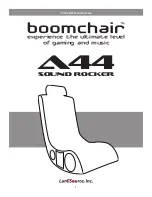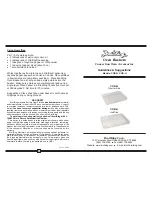
9
4. Operation and Charging
4.1 Determine Charging Voltages
To determine the appropriate equalization (freshening) charge voltage and float charge voltage, multiply the number of batteries connected in
series in the battery cabinet by the recommended charging voltage per unit.
For example:
A +/- 240 VDC cabinet containing 40 each of the HRL12540WFR batteries in series would use the following charging voltages:
Freshening/Equalization Charge Voltage = 20 x 14.4 VDC/unit average= +/- 288 VDC
Float Charge Voltage = 20 x (13.5 to 13.8 VDC/unit average) = +/- 270 to 276 VDC
4.2 Initial Charge
After the correct charging voltages have been calculated, follow these steps:
1. Adjust the charger/rectifier equalization and float voltage outputs to the appropriate level.
2. Place the charger/rectifier in equalization mode. Tripp Lite SmartOnline UPS units adjust the charging voltage level automatically based on
present battery voltage.
3. Close the disconnect switch/circuit breaker connection from the charger/rectifier to the battery cabinet(s) and start a 24-hour freshening
charge at the equalization charge.
4. After a few minutes on charge, monitor the voltage across several of the individual batteries to assure they are charging at the proper
value.
5. Following completion of the freshening charge, place the charger/rectifier in float charge mode. Tripp Lite SmartOnline UPS units adjust
the charging voltage level automatically based on the status of the battery voltage.
6. After the battery cabinet has been on float for an additional 1 to 24 hours, complete the operational check
(Section 4.3)
.
4.3 Operational Check
1. Measure and record the total system float voltage. Measure at the battery terminals.
2. Measure and record the system float current using a clamp-on ammeter.
3. Measure and record the float voltage of individual battery units.
4. Measure and record the temperature of several of the batteries. (Measure battery temperature with a digital thermometer by placing the
surface thermocouple on the flat surface of the negative terminal—not the “L” connection surface. An infrared temperature monitor can
also be used.)
5. Optional: Perform impedance and conductance tests on individual battery units. These tests require special equipment, but the data can
be useful in trending the system over time or identifying suspect units during later periodic checks. It may be necessary to disconnect the
battery system from the charger/load during these checks.
6. If the acceptance test is being performed, proceed to
Section 4.4
. If the acceptance test is not being performed, close the cabinet’s
front door. The battery cabinet is now in operation.
4.4 Acceptance Test (Optional)
1. Open the front door of the battery cabinet to access internal components. Use a digital voltmeter when voltage measurements are
required.
2. Determine the discharge rate (e.g. 15 seconds, 5 minutes, 15 minutes) at which the battery is to be tested.
3. Select a battery from the center of the battery cabinet and measure the temperature at the flat surface of the negative terminal. If the
temperature is below 74° F or above 80° F, the test load should be temperature compensated accordingly.
4. Review the final check data and assure that all unit float voltages are acceptable.
5. During the acceptance discharge test, monitor the cabinet system output voltage at the cabinet, the output current and discharge time
as a back-up to monitoring at the critical load.
6. Run the test in accordance with the IEEE standard.
7. Close the cabinet’s front door. The battery cabinet is now in operation.
Summary of Contents for BP192V787C-1PH
Page 12: ...12 Dimensions INCHES cm 6 Diagrams 6 1 2 All BP240V Models 3 Shelves...
Page 13: ...13 6 Diagrams 6 1 3 BP480V200 Model 4 Shelves Dimensions INCHES cm...
Page 14: ...14 Dimensions INCHES cm 6 Diagrams 6 1 4 BP480V300 and BP480V400 Models 4 Shelves...
Page 15: ...15 6 Diagrams 6 1 5 BP480V500 Model 4 Shelves Dimensions INCHES cm...
Page 38: ...38 Dimensiones PULGADAS cm 6 Diagramas 6 1 2 Todos los Modelos BP240V 3 Repisas...
Page 56: ...56 2 0 40 C 25 C C VW 1 FT 1 C...
Page 57: ...57 2 Tripp Lite 24 3 24 C Tripp Lite...
Page 58: ...58 3 2 3 1 8 3 2 1 Tripp Lite 2 3 3 3 1 2 3 4 C Tripp Lite 5 7 2 6 7 8...
Page 62: ...62 5 5 1 1 25 C 25 C 8 25 50 33 2 13 2 14 2 3 1 2 3 100 10 4 4 1 2 7 2 3...
Page 63: ...63 6 6 1 6 1 1 BP192V787C 1PH 2 c...
Page 64: ...64 6 6 1 2 BP240V 3 c...
Page 65: ...65 6 6 1 3 BP480V200 4 c...
Page 66: ...66 6 6 1 4 BP480V300 BP480V400 4 c...
Page 67: ...67 6 6 1 5 BP480V500 4 c...
Page 68: ...68 6 6 2 6 2 1 192 UL MTW 105 C UL 600 UL 50 600 42 216 221 120 208 240 192 218 218...
Page 69: ...69 6 6 2 2 240 UL MTW 105 C UL 600 UL 70 600 42 270 276 240 273 120 208 240 273...
Page 70: ...70 6 6 2 3 240 UL MTW 105 C UL 600 UL 150 600 42 1 2 3...
Page 71: ...71 6 6 2 4 240 UL MTW 105 C UL 600 UL 250 600 42 N...
Page 72: ...72 6 6 2 5 EBP 120 UL MTW 105 C CSB HRL FR UL 600 6 250 MCM 1 11 20 120 120 240...
Page 75: ...75 6 6 3 7 A c 120 208 240 60 13 65 0 15 30 120 20 208 20 240 15 A Charger OK...
Page 79: ...79...
Page 80: ...80 1111 W 35th Street Chicago IL 60609 USA www tripplite com support 19 02 084 93 3390_RevE...










































